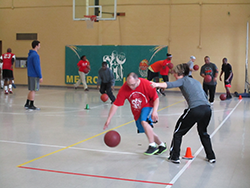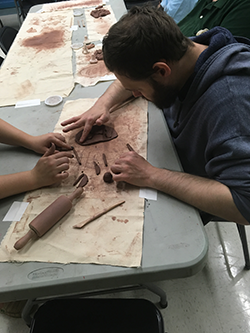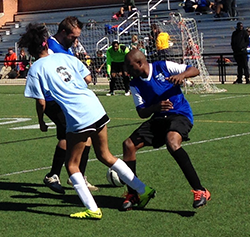Inclusion Services
Therapeutic Recreation Program
Inclusion Services
Inclusion services allow youth and adults of various abilities to participate in recreation and leisure activities together, wherever the program is being offered.
 What is Inclusion?
What is Inclusion?
- A process
- Persons with disabilities are actively participating in recreation, social, educational, and developmental opportunities along with their peers without disabilities
- Providing opportunities for choice
- Providing necessary support to ensure recreation is fun and matches skills with challenge
- Creating environments for meaningful engagement
- Not a one-time event or separate service
- Process of learning, preparing, experiencing, and growing with each person in each recreation opportunity
Inclusive recreation takes place when individuals of all abilities participate in a recreational activity together in an attempt to decrease barriers to leisure by utilizing adaptations and programming accommodations.
What are the minimum requirements for successful inclusion?
- Meeting the age and registration requirements of the program
- Following the rules of conduct (with or without reasonable accommodations)
- Voluntary participation; recreation programs and activities are voluntary in nature, however, participation will be encouraged and aided but not forced
- Level of ability, with or without reasonable accommodations, the participant will engage in scheduled activities for the majority of the program time
- Ability to tolerate and function, with assistance, in a larger social group (10 or more people)
How to Register for the Inclusion Services
 Step 1: Participants must register and request a disability accommodation at the time of registration. To receive a disability accommodation, the requests MUST be received at least two weeks prior to the program start date.
Step 1: Participants must register and request a disability accommodation at the time of registration. To receive a disability accommodation, the requests MUST be received at least two weeks prior to the program start date.
Step 2: The inclusion specialist receives disability accommodation requests via email/phone call from the facility or program. The inclusion specialist or lead inclusion assistant follows up on disability accommodation requests by contacting the patron (usually by phone) and conducting an assessment to determine the specific disability accommodation to be provided. Disability accommodations provided may include (but are not limited to):
- use of companions (inclusion assistant)
- sign language interpretation
- large print/Braille
- support staff
- adaptive equipment
- accessible transportation, if part of the program (i.e. field trips)
- disability and sensitivity training
- notification to instructors/ program directors of participant’s disability accommodation information
Step 3: Inclusion specialist or lead inclusion assistant secures the disability accommodations. The process to provide a disability accommodation may take up to two weeks (i.e. hiring and training inclusion support staff, securing adaptive equipment, etc.).
Step 4: The inclusion specialist or lead inclusion assistant completes the assessment form once the accommodation is in place and provides accommodation information to the program director in advance of the program start date. The program director provides the information to the instructors/program directors for informational purposes prior to the start of class/program. Additional disability accommodation information may be obtained through the Therapeutic Recreation Office.
Step 5: Instructors/directors, program staff, and volunteers provide a welcoming program environment for participants with disabilities along with the accommodation provided (i.e. support staff, sign language interpreter, companion, etc.).
Step 6: The inclusion specialist or lead inclusion assistant evaluates the disability accommodations provided. A variety of evaluation methods may be used, including:
- program observations
- feedback from program supervisors
- feedback from participants
- feedback from parents/guardians/family members
- feedback from instructors/program directors
The inclusion specialist or lead inclusion assistant will further assess the disability accommodation provided, make adjustments as needed, and re-evaluate the accommodation.
 Benefits of Inclusion
Benefits of Inclusion
- Ensures that all residents are given the freedom of choice
- Fosters an increased sense of independence in leisure activities
- Provides an opportunity for all residents of a community to learn more about each other, appreciate individual differences, and celebrate diversity
- Provides services focused on meeting the needs, interests, and abilities of each individual
- Enhances the quality of life for all involved in the process
What services are not part of inclusion?
- Physical restraint or intervention beyond gentle redirection
- Provision of a separate area or alternate activities for a significant portion (more than 25%) of the scheduled program
- The exception to minimum compliance with the program's rules and regulations, with or without accommodations, established for the safety of all program participants and staff
- Hiring, selection, or guaranteed assignment of a specific staff member
- Individualized therapy within a program
- Provision and/or purchase of personal custom devices
- Guarantee of Inclusion Support availability at the desired time of program
- Assistance feeding or using the restroom
For information on inclusion services,
contact the Inclusion Specialist
(410) 396-1550
Therapeutic Recreation Program
4501 Farring Ct., Baltimore, MD 21225